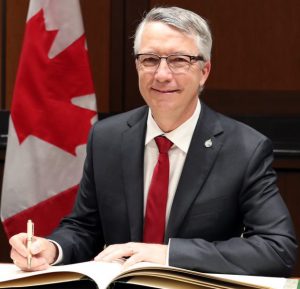OTTAWA – Wellington-Halton Hills MP Michael Chong and Perth-Wellington MP John Nater share a similar pessimism when it comes to the federal budget released last week.
Both are criticizing the increased spending and saying more debt will not ultimately help local people.
“I’m not one for being hyperbolic. This is a terrible budget,” said Chong. He called it a “tax and spend budget” that “fails to address the economic crisis that we are going through.”
Nater described it in simple terms, including “more spending, more debt, and more inflation.”
Tabled on April 16 by Finance Minister Chrystia Freeland, the budget includes more than $52 billion in new spending over five years.
The 400-plus-page Budget 2024 document, subtitled “Fairness For Every Generation,” seems geared at addressing concerns of younger Canadians.
“A fair chance to build a good middle class life – to do as well as your parents, or better – that’s the promise of Canada. For too many, especially for younger Canadians, that promise is at risk,” Freeland stated in the document’s forward.
“We have a plan to fix that.”
She goes on to describe plans to build more affordable homes and to help Millennial and Gen Z renters make progress toward home ownership by having the rent they pay count toward their credit score.
Bringing down everyday costs with things like $10-per-day child care, and new programs to help with dental care and prescriptions “will further ease the financial burden,” Freeland wrote.
She also claimed the plan will help grow the economy, increase investment, enhance productivity, and encourage innovation.
The government will help cover some of the cost of its spending by changes to the tax system, making it “more fair by asking the wealthiest to pay their fair share,” stated Freeland.
According to the budget document, proposed tax system changes are expected to generate $21.9 billion in revenue over five years to invest in things like building homes and creating jobs.
But Chong expressed concern that some of the changes could negatively impact families, specifically farm families, in his riding.
The increase to the capital gains tax, he said, will see the tax rate on capital gains above the first $250,000 jump from 26.8 per cent to 35.7%.
“That’s a big jump in taxes,” Chong said. “It’s going to make it more difficult for farm families to pass along their farms from one generation to the next.”
Nater said he feels farmers were largely overlooked in the budget.
“The government should have agreed to exclude grain drying and the heating and cooling of barns and greenhouses from the carbon tax, but they chose not to,” he stated in an email to the Advertiser.
He noted all three opposition parties supported a bill that would have created such an exemption for farmers, but the Liberal government wouldn’t pass it in its original form.
“Including it in the budget would have benefited the farmers who feed our country and the families who are struggling to put food on the table,” Nater stated.
Overall, he said he sees little in the budget that helps local people, noting the government’s Housing Accelerator Fund excluded communities like those in Perth and Wellington.
The budget includes a $400-million top-up to the $4-billion fund, which is meant to help municipalities cut through red tape to get homes built faster.
“To see more funds put into programs that have not brought a dime of funding to our communities for housing leaves me with very little optimism,” wrote Nater.
He criticized the government for believing more spending would solve its problems, pointing out it is now spending more on debt interest than it spends on health care.
Chong highlighted the same issue, saying the interest cost on the debt this year will be $54.1 billion.
“Just five years ago, interest charges on the debt were less than half of this,” he said.
He added the government’s fiscal policy is not aligned with the monetary policy of the Bank of Canada.
“This budget will likely slow down the anticipated cuts to variable interest rates,” Chong said. “It’s a budget that threatens investment and growth, and it’s the worst budget in decades.”

GUELPH MP LLOYD LONGFIELD (Submitted photo)
Liberal Guelph MP Lloyd Longfield was much more positive about the budget. He did note he expects criticism of the tax changes from the wealthiest one per cent.
“They are noisy and we will hear from them,” Longfield said, but he also said he believes there are wealthy philanthropists who support the measures.
“It shouldn’t be a class war. If you help the people who are struggling, everyone will benefit,” he said.
He highlighted a few different ways the budget aims to help those who are struggling. One measure he thought would have significance locally is the money set aside for a national school food program: $1 billion over five years.
“If we took that food pressure away; that takes a big social pressure off people who are feeling the impact of tightening budgets,” Longfield said.
He also pointed to measures in the budget meant to help young people afford homes, including more flexible mortgage rules and the move to allow renters to use their payment history to strengthen credit scores.
“They’re working hard, they’re doing all the right things, and they can’t afford to get a house,” Longfield said.
He acknowledged it’s going to take years for the new housing the government is hoping to see built to actually become a reality, but said in the meantime, the budget has measures aimed to reduce people’s other costs.
“We’re helping them with other bills while we’re building the housing,” Longfield said.
One disappointment he noted in the budget was the $200-per-month Canada Disability Benefit, aimed at supporting low-income persons with disabilities.
It’s the largest single line item on the budget at $6.1 billion over six years, but Longfield lamented it is not nearly enough.
“We’re not going to get people out of poverty with this,” he said.
“I always want more faster, but the reality is the finance minister needs to balance a whole bunch of things.”




